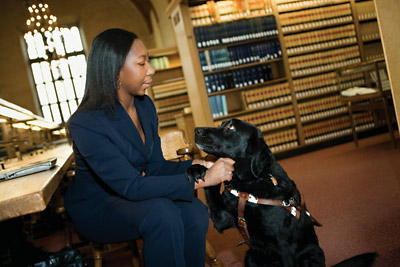Blindness no barrier to Angela Winfield's passion
By Judith Pratt

Ever since she was a child, Angela C. Winfield wanted to be a lawyer. Her inspiration came, she says, not from the courtroom but from "The Cosby Show."
"Clair Huxtable was a lawyer," Winfield says. "And although they never showed her working, I still wanted to be like her."
Plus, she adds: "I do like to argue. Not conflict, but argument. I enjoy a challenge -- and I like proving people wrong."
Winfield attended Barnard College, where, after many years with a severe visual impairment, she became completely blind. She continued with her studies, worked as a paralegal intern for a civil rights attorney and spent the spring semester of her junior year at Queen Mary College in London.
Winfield chose Cornell over several other law schools. "I knew I could go to school in a large city, but I had never lived in a small rural area," she says. "I visited and really liked it. After I visited, they sent me an e-mail, and several people called."
She served on the University Committee on Web Accessibility and as a summer editor for the Legal Information Institute (LII) Bulletin, where she also worked on Web-accessibility issues. "I used the LII before I even got into law school, and they're actually accessible," she recalls.
Web accessibility means coding Web pages so that specialized software can make them user-friendly to the visually impaired. "The community is trying to come up with a plan to make academic Web sites accessible. That kind of universal design, whether on Web sites or in architecture, helps everybody," says Winfield.
Winfield uses software called JAWS (Job Access With Speech) to convert electronic text to synthesized speech. "Everything I type is read to me," she explains. "That's the way I process everything. Braille is not efficient for me."
She also has a guide dog named Ogden. "He's my first dog, and he's a wonderful partner," she says. "He's my lifeline, my pet and my tool. When I had a cane, it was rare that people would say hello. Ogden breaks the ice."
She says that all of her professors have been very supportive. "I've been treated like a regular law student," she says.
During her time at Cornell, Winfield has interned with the Cornell Legal Aid Clinic; worked with BR Legal, a student group that provides legal services to startup businesses; and clerked with Hon. Mark H. Fandrich, the surrogate court judge and acting Supreme Court justice in Auburn, N.Y.
She also has been very active with Moot Court competitions and served on the Moot Court board. She enjoys the courtroom because, she says, "I am a much better advocate for other people. I've always been better taking on a voice for somebody else."
Following up on her talent for litigation, she served as a summer associate with Hiscock & Barclay in Syracuse and has accepted a job there in torts and products-defense litigation. "Law is a service industry," she says. "I'll always do pro bono work, but I don't think I could do public-interest law full time. I find it very emotional. It takes a toll. Corporate clients need help, too. I'm just as passionate, but I can focus on the issues."
Throughout her life, Winfield says, she has received tremendous support from her family and her boyfriend, who lives in Auburn.
"The reason why I am what I am is because of my parents," she says. "The school system wanted to put me in special education; my parents said no. I didn't know I was different until I got out into the world."
Still, Winfield says, "My mom is a worrywart, and I know how strong she was to let me go. I'm really looking forward to my graduation from law school. I can't think of anything better to give her."
Judith Pratt is a freelance writer in Ithaca, N.Y. This article was abridged with permission from the spring 2008 issue of the Cornell Law Forum (34:2). All rights reserved.
Media Contact
Get Cornell news delivered right to your inbox.
Subscribe